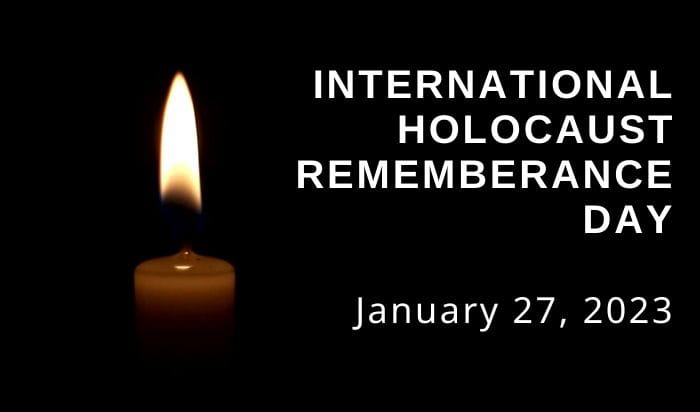
27 January 2023 – – International Holocaust Remembrance Day (or the International Day in Memory of the Victims of the Holocaust) is an international memorial day designated by the United Nations to be the 27th of January, the anniversary of the liberation of the German Nazi concentration and extermination camp Auschwitz in 1945. Today marks the 78th anniversary of that liberation.
It is a day for everyone to reflect on and honor and remember the six million Jews murdered in the Holocaust, and also the genocides in Armenia, Bosnia, Cambodia, Chechnya, Darfur, Myanmar, Rwanda, Ukraine, Yemen, etc.
There will be a full program at Auschwitz later today which you can watch by clicking here. The main theme of the 78th anniversary will be the process of planning, creating and expanding the system of dehumanisation and genocide at Auschwitz, which was particularly strongly defined by the words of survivor Marian Turski “Auschwitz did not fall from the sky”. As the Auschwitz web site notes:
While the function of Auschwitz as an extermination center was taking shape in 1942, in 1943 the scale of operation became industrial. In the spring of that year, the Germans completed the construction of four installations at Auschwitz II-Birkenau, which included gas chambers and modern facilities for cremating corpses.
Said Auschwitz Museum Director Dr. Piotr M. A. Cywinski: ‘Today visitors to the Memorial can see the ruins of buildings that become a symbol of the extermination of Jews, but also of other crimes committed at Auschwitz against Poles, Roma, Russians and people of other nationalities. However, architectural and construction plans survived, which clearly shows what a human being, even a well-educated one, is capable of doing on behalf of an ideology. All these remains are an eloquent warning to mankind, how eloquent today in light of Russia’s war crimes in Ukraine”.
As most of my regular readers know, over the last 5 years I have been involved in a film project that has been the most challenging of my career: a deep dive into the political uses of genocide and massacre, as seen through the life of Jacques Semelin, one of the world’s leading authorities on the subject. I’ve come full circle. When I became involved in war crime investigation work 15+ years ago, I was introduced to Jacques’ work. My mentors told me he was the seminal authority on massacre and genocide.
The work has involved 100+ hours of video interview time with Jacques plus numerous other genocide authorities such as Serge Klarsfeld, Jean-Marc Dreyfus and Edyta Gawron. It has also allowed me unfettered access to the two Holocaust memorials in Paris, the Holocaust memorial in Washington D.C., a trip to the death camp at Auschwitz, and the “Topography of Terror” – an outdoor and indoor history museum in Berlin, Germany that is located on the remains of Nazi regime’s security entities: the Sicherheitspolizei, the Einsatzgruppen and the Gestapo. But my work also includes study of the genocides in Yugoslavia and Rwanda. What started as one film has now resulted in a series of videos and films.
Genocide is the most disturbing example of dehumanization‘s destructive power. Dehumanization fuels the worst brutality that human beings perpetrate against one another. It’s not just a problem of the modern industrialized world. It’s haunted humanity from millennia. We find traces of it in writings from the ancient civilizations of Egypt, China and Mesopotamia – in Medieval European characterizations of Jews and Medieval Arabs’ characterizations of black Africans, and far-flung indigenous cultures such as the head hunting Munduruku people of Brazil who referred to their human pray as pariwat, a word that’s otherwise reserved for game animals.
To mark International Holocaust Remembrance Day, I offer two items:
• A poem by Matilda Olkinaitė from an anthology in my library, Poetry of the Holocaust (2019). Matilda Olkinaitė, aged nineteen, was shot by local Nazi collaborators, together with other members of the two Jewish families in the Lithuanian village Panemunėlis. Poems such as this enable us to hear the voices of those who were murdered because they were Jewish, or disabled, or who opposed the Nazis on religious or political grounds.
• One of the videos in my series entitled “Genocide begins with dehumanisation”.
ALL THE SKIFFS HAVE FOUNDERED
Matilda Olkinaitė
All the skiffs have foundered
And mine will sink as well.
Death is wading
Through troubled waters.
And Death bade me
Sing my final hymn.
And Death bade me
Dance my final dance.
And so I sing my hymn
To the seagulls and the swells.
The azure heavens listen,
And I sing to them too.
And the sea carries my skiff
Through a window,
Carries me away to sleep,
And will pull me under.
Tonight Death wanders
Through restless waters.
The sun has sunk already
And my skiff will sink as well.
Translated from Lithuanian by Laima Vincė
As I noted above, genocide is the most disturbing example of dehumanization‘s destructive power. Dehumanization fuels the worst brutality that human beings perpetrate against one another. It’s not just a problem of the modern industrialized world. It’s haunted humanity from millennia. The following is short clip from a longer piece-still-in-progress I am producing on dehumanisation. I filmed it last year at the Auschwitz death camp where we spent several days filming the final segments of my upcoming film: